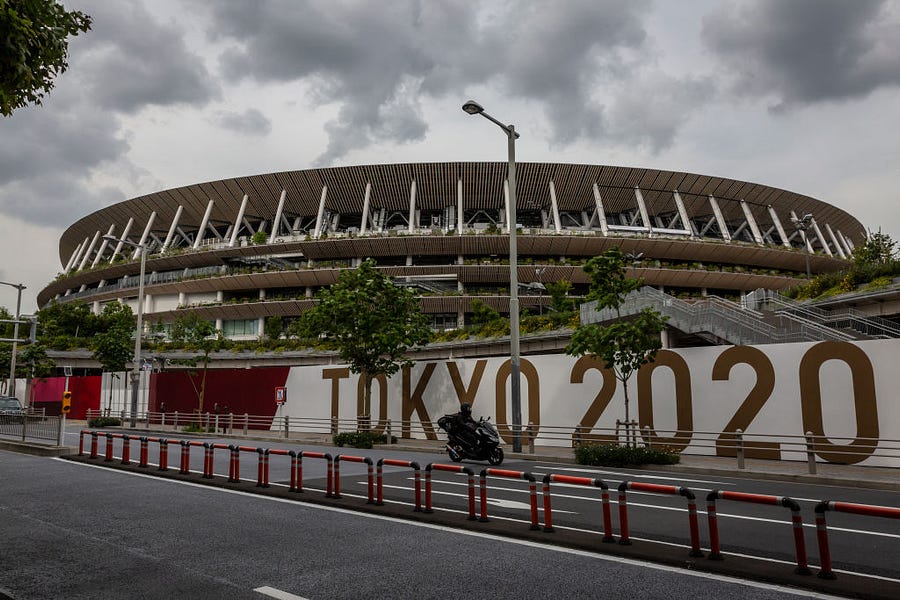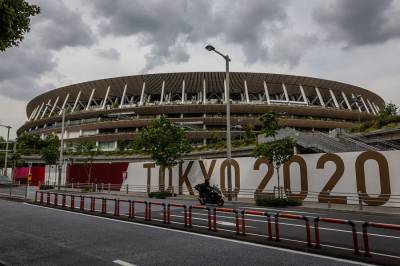A year after they were postponed because of the coronavirus, the Summer Olympics are scheduled to be held in Japan this summer. But a growing number of Japanese citizens are calling for the games to be canceled in response to a spike in positive COVID-19 cases in the country.
As of June 6, Japan had 43,275 active cases with a seven-day average of 2,673 new cases per day—seemingly manageable numbers in a country of more than 120 million, but still its highest numbers since January.
Mitigating the spread of COVID-19 remains a considerable issue in Japan, as the country has fully vaccinated only 3.4 percent of its population, a result of vaccine hesitancy and a shortage of medical staff to deliver the shots.
The recent surge has forced the Japanese government to extend a national state of emergency—issued on April 25—until June 20. The Tokyo Games are scheduled to begin July 23 and run through August 8. The state of emergency requires some businesses to shorten their hours and limits attendance at large gatherings.
“New coronavirus cases have been declining nationwide since mid-May, but the situation remains highly unpredictable,” Prime Minister Yoshihide Suga told a government task force after finalizing the decision.
As cases continue to rise and the vaccine rollout stalls, the U.S. State Department recently issued a “Level 4: Do Not Travel” advisory pertaining to Japan—the highest cautionary level in the department's hierarchy of warnings.
Last week, a poll out of Japan found that 83 percent of citizens do not want the Olympics or Paralympics held in Tokyo this summer. The total was up 14 percentage points from a similar poll in April.
The public backlash to hosting the Olympics was compounded when about 10,000 of the 80,000 unpaid volunteers for the Tokyo Olympics and Paralympics told organizers they would not participate in the games.
“We have not confirmed the individual reasons,” organizers told reporters. “In addition to concerns about the coronavirus infection, some dropped out because they found it would be difficult to actually work after checking their work shift, or due to changes in their own environment.”
The Asahi Shimbun, a major Japanese newspaper with the second-largest print circulation in the world, joined the chorus of calls for the cancellation of the games last week.
“We demand that Prime Minister Yoshihide Suga evaluate the situation calmly and objectively, and decide against holding the Olympics and Paralympics this summer,” the newspaper said in an editorial headlined, “Prime Minister Suga, please call off the Olympics this summer.”
The International Olympic Committee and the Tokyo Organizing Committee intend to move forward with the games but acknowledge that issues remain with the Japanese public.
“Preparations for safe and secure Games are proceeding steadily, but I am aware that we must work all the harder to ensure that the people of Tokyo and Japan also feel that sense of safety and security,” Seiko Hashimoto, the president of the Tokyo Organizing Committee, told reporters.
The IOC and Tokyo Organizing Committee have established a comprehensive “playbook” designed to mitigate the spread of COVID-19 among athletes and staff who attend the games.
The guidelines require all participants to test negative for COVID-19 twice within 96 hours before departure and again upon arrival in Japan. Once participants are cleared to enter the country, the guidelines mandates daily testing for athletes and staff close to competitors, limits dining to locations where COVID-19 countermeasures are in place, and obligates all participants to wear face coverings when not competing. In addition, there will be no spectators allowed from outside Japan.
The IOC remains confident that the games can proceed safely and has said it anticipates that more than 80 percent of the residents in the Olympic Village will be fully vaccinated by the beginning of the games.
“It has become clearer than ever that these Games will be safe for everyone participating and the Japanese people,” said IOC official John Coates.
According to the host city contract, only the IOC can make the unilateral decision to cancel the games. If the Japanese government were to tell the IOC that it can no longer accommodate the Olympics this summer, Japan would be subject to a massive legal suit from the IOC.
Canceling the Olympics entirely would be financially devastating for both the IOC and the Japanese government—which explains, in part, the "full steam ahead" approach from both parties. Both the IOC and Japan stand to lose billions of dollars if that happens.
Andrew Zimbalist, a professor of economics at Smith College who writes extensively about the Olympics, told The Dispatch that he doesn't expect the IOC will cancel the games because there is too much money at stake.
“If the games are not held, the IOC would lose most of their international television contracts, which are somewhere in the neighborhood of $4 billion. They would also lose some of their international sponsorship contracts, which are a couple billion dollars as well,” Zimbalist told The Dispatch.
It’s a more complicated situation for the Japanese government, which must balance financial considerations against public opinion.
“The Japanese government really has a dual challenge. On the one hand, they have the media and popular uprising against holding the games. On the other hand, they have spent around $30–40 billion so far. It would be a great embarrassment if all of that money went for nothing,” Zimbalist continued. “They're already going to lose a great amount of money. They were hoping to make $900 million in ticket sales, but since they aren't allowing spectators from outside of Japan, they won't make anywhere near that. If they allow domestic spectators, they might make between $100 and $200 [million].”
The United States Olympic and Paralympic Committee is confidently operating under the assumption that the Tokyo Games will occur this summer.
“We are fully intending to take two delegations this summer,” a senior U.S. Olympic official told The Dispatch. “We have very serious safety protocols in place domestically, and we’re confident in the mitigation policies put in place by the Tokyo Organizing Committee.”
“The games are awesome. They’re incredible. These games are going to be really different. The competitions will be great. The venues will be great. The TV productions will be great. But the piece that'll be missing is that kind of global celebration and camaraderie that makes the Games so special,” the official said.






Please note that we at The Dispatch hold ourselves, our work, and our commenters to a higher standard than other places on the internet. We welcome comments that foster genuine debate or discussion—including comments critical of us or our work—but responses that include ad hominem attacks on fellow Dispatch members or are intended to stoke fear and anger may be moderated.
With your membership, you only have the ability to comment on The Morning Dispatch articles. Consider upgrading to join the conversation everywhere.